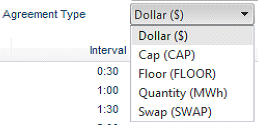What is a Reallocation?
A Reallocation A reallocation transaction, as defined in the NER is a Rules The National Gas or Electricity rules.-supported agreement that is approved between AEMO Australian Energy Market Operator and two parties (you and a Counterparty The authoriser of the Reallocation), enabling a settlement transaction (an amount of money) to be exchanged.
One Party The initiator of the Reallocation is designated the Credit Participant and receives credit from the Reallocation, whilst the other Party is the Debit Participant. Either Party can submit the Reallocation request that generates matching debit and credit transactions of equal value and is included in the participants’ settlement statements.
Both parties must have an executed Letter of Agreement with AEMO.
Reallocation transaction
A reallocation transaction is an authorised request in Reallocations Reallocation Request Service. See Relevant Rules or Procedures in the Markets Portal Web applications for registered participants only. Requires access to MarketNet..
Roles
Depending on their roles, the two parties to a Reallocation are called the Party (who initiates the request in the system) and the Counterparty (who authorises a request) or the Debit Participant (who receives a debit settlement transaction on the settlement statement) and Credit Participant (who receives a credit).
Agreement types
A Reallocation can have one of five different agreement types—dollar, cap, floor, quantity, or swap. Each agreement type requires you to enter values for each of the 48 half-hour trading intervals in the Reallocation. For example, a Reallocation may define an agreement for one participant to receive credit for the specified quantities of energy for each trading interval from 25 December to 31 December, or an agreement to receive a debit (normally offset against physical energy credits) for a specific dollar value between certain trading intervals on a particular day.
The agreement type is the trading amount, this must be either a dollar ($), cap (CAP), floor (FLOOR), quantity (MWh energy), or swap (SWAP) value.
Cap, floor, and swap agreement types are only available to market customer, market generator, or MNSP participant categories.
If the agreement type is:
- Dollar ($), the values entered for the Reallocation are direct dollar amounts. The dollar amount is applied for the respective trading interval for each day of the Reallocation. Normally only a single dollar value is specified in the first trading interval.
- Cap (CAP) the values entered for the Reallocation are quantity (MWh) values and price ($/MWh) values. To determine the transaction amount the quantity value is multiplied by the difference between the half-hourly regional reference price (where this price is greater than the Reallocation price) and the Reallocation price.
- Floor (FLOOR) the values entered for the Reallocation are quantity (MWh) values and price ($/MWh) values. To determine the transaction amount the quantity value is multiplied by the difference between the half-hourly regional reference price (where this price is lower than the Reallocation price) and the Reallocation price.
- Quantity (MWh) Referred to as energy offset in the Reallocation Procedures, the values entered for the Reallocation are quantity (MWh) values. To determine the transaction amount, the quantity value is multiplied by the regional reference price for the region selected, for each trading interval.
- Swap (SWAP) the values entered for the Reallocation are quantity (MWh) values and price ($/MWh) values. To determine the transaction amount the quantity value is multiplied by the difference between the half-hourly regional reference price and the Reallocation price.
 To select an agreement type, click the drop-down arrow and select from the list.
To select an agreement type, click the drop-down arrow and select from the list.
Profile type
In the Reallocation you can specify different Reallocation values for different kinds of days within a Reallocation period. This is called a Profile Type:
- If the same Reallocation values are applied every day during the Reallocation period, you specify a Profile Type of Flat - All Days.
- If you want to specify a different quantity for weekdays and weekends or public holidays, you can create one Reallocation Transaction See Relevant Rules or Procedures with a Profile Type of Business As defined in the NERL. – Weekdays, and a second Reallocation Transaction See Relevant Rules or Procedures with a Profile Type of Non-business - Weekends and Public Holidays.
Business and non-business days are determined in accordance with the Settlement Calendars on AEMO’s website.